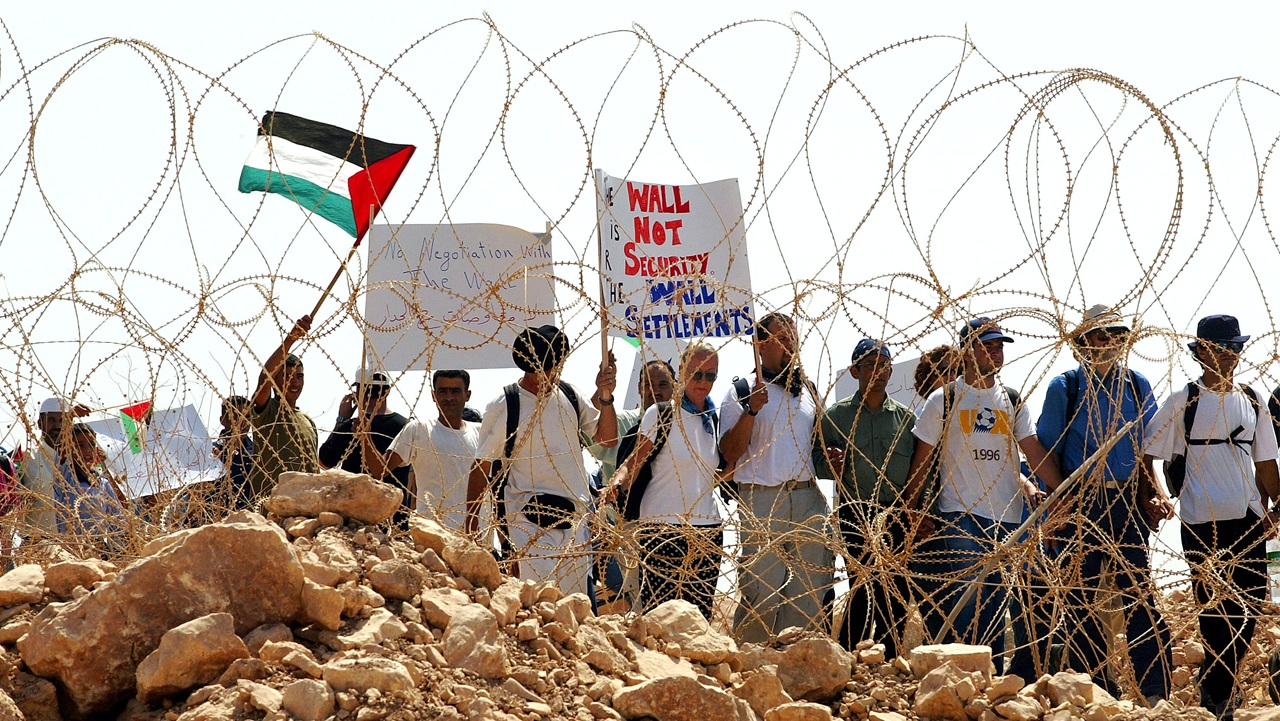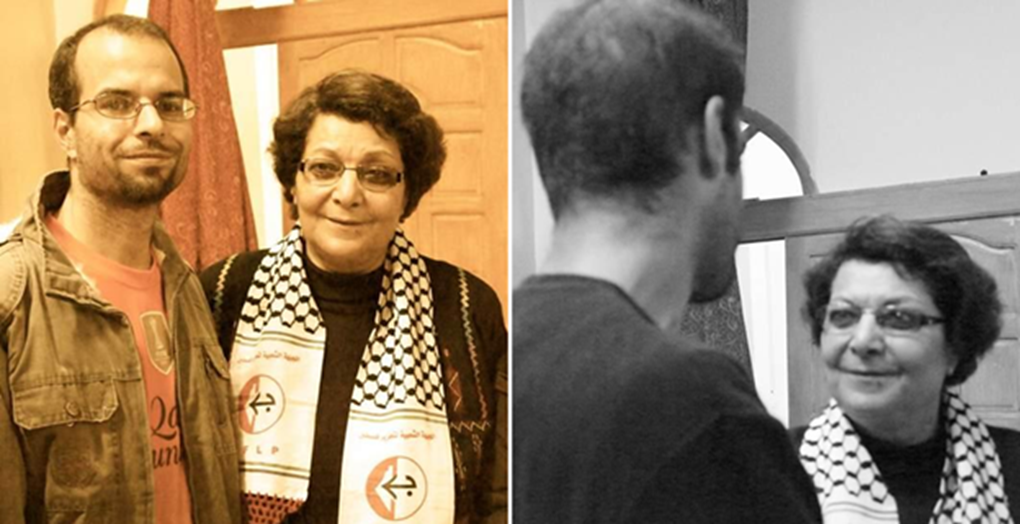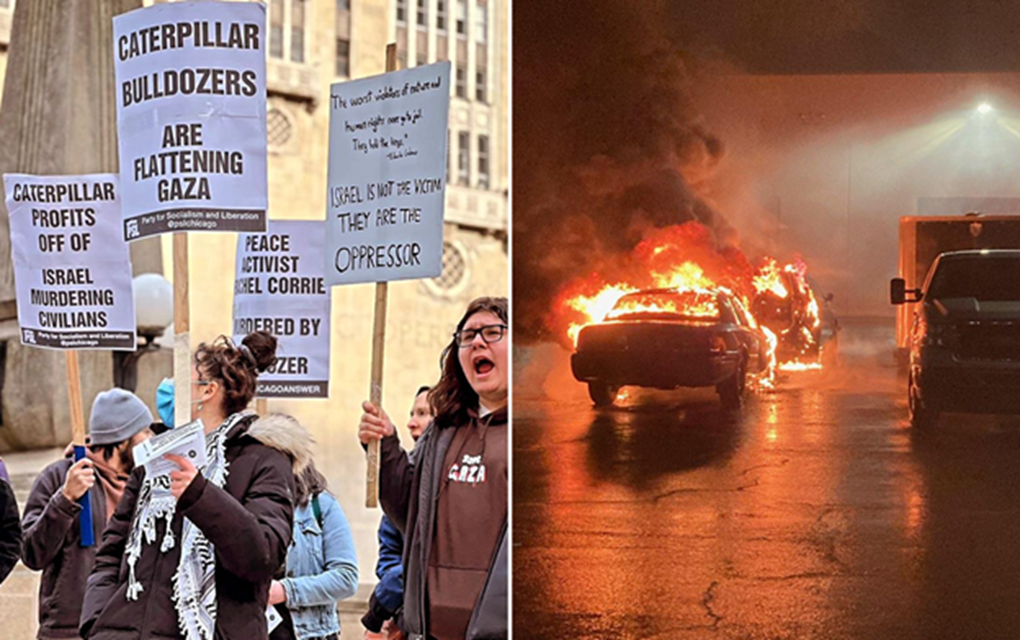
Palestinians and activists from the International Solidarity Movement (ISM) protest against Israel's security fence on August 15, 2003 at the West Bank Palestinian village of Khirbet Ras Atira. (David Silverman/Getty Images)


Key Points
Introduction
The International Solidarity Movement (ISM) is an international anti-Israel group based in the Palestinian territories that for more than two decades has sent volunteers to the West Bank and Gaza to confront and disrupt the Israeli military via direct action. ISM members also seek to shape media and public discourse to support the Palestinian cause by documenting and sharing their activities, often in conjunction with other anti-Israel groups and activists.
ISM quickly gained visibility on the international stage in its early years with high-profile activities during the Second Intifada. The 2003 death of American ISM volunteer Rachel Corrie in Gaza also drew significant attention and had a lasting impact on anti-Israel activity globally.
The death of another American ISM volunteer, Ayşenur Eygi, in the West Bank in 2024 and the heightened attention on the region during the Israel-Hamas war thrust the group back into the international spotlight after more than 20 years of continuous activity on the ground and beyond.
History & Background
Founded by Palestinian, Israeli and American activists in 2001, ISM received its first substantial media coverage in the spring of 2002, when ISM volunteers bypassed an Israeli military siege of Palestine Liberation Organization (PLO) Chairman Yasser Arafat’s compound in Ramallah during Israel’s Operation Defensive Shield during the Second Intifada. ISM members executed their second major action that year when they entered the Church of the Nativity in Bethlehem during a military standoff between Israeli forces and Palestinian terrorists.
ISM has continued its activities for more than two decades since then. ISM’s tactics — a combination of on-the-ground, direct actions and the associated documentation and sharing of those activities — have remained consistent throughout its history. ISM has led several high-profile campaigns that have received international attention and support, including flotilla missions. Multiple ISM volunteers have been killed or seriously injured during protests and actions organized by the group in the West Bank and Gaza.
Over the years, ISM has sought to leverage periods of renewed attention on the Israeli-Palestinian conflict to attract new international volunteers to join its ranks. For example, on October 9, 2023, only two days after Hamas’s October 7 terrorist attack on Israel that killed 1,200 people and sparked the Israel-Hamas war, ISM published a statement “calling for all those who stand in solidarity with Palestine to join ISM’s efforts on the ground in the West Bank.”
Though ISM claims to promote nonviolent means of resistance, it voices support for others who engage in armed violence against Israel and has been linked to U.S.-designated terrorist groups including Hamas on numerous occasions throughout its history. ISM also co-sponsors actions alongside other anti-Israel groups overseas; ISM-sponsored events in the U.S. have included calls for violence against the Jewish community.
ISM volunteers state that the group’s leadership structure is non-hierarchical and consensus-based. Some of ISM’s co-founders, including Israeli activist Neta Golan, continue to guide the group’s strategic direction and public messaging. Longtime volunteer coordinators, some of whom have been with the group since its early years, also play a key role in ISM operations and the recruitment and training of new volunteers. ISM chapters in North America and Europe support the group’s work in the Palestinian territories.
Organizers of anti-Israel events frequently invite ISM’s founders and volunteers to speak during anti-Israel events in the U.S., Europe and elsewhere around the world. ISM co-founder Huwaida Arraf, for example, continues to be a prominent figure in the anti-Zionist movement globally; she appears regularly on panels and other similar events and she has run unsuccessfully for elected office in the U.S. twice since 2021.
ISM is able to carry out its activities through funding it receives from multiple sources. The group has historically accepted donations both directly from supporters and via fiscal sponsors. Its past fiscal sponsors include the A.J. Muste Memorial Institute, a New York-based foundation that provides a channel for tax-deductible donations to various antiwar and social justice organizations.
The Association for Investment in Popular Action Committees, a California-based nonprofit organization that supports various projects in the Middle East and whose name plays on the AIPAC acronym more commonly associated with the pro-Israel lobbying group, fiscally sponsored ISM’s Northern California chapter (ISM NorCal) for many years. Longtime ISM member and ISM NorCal co-founder Paul Larudee serves as treasurer of the Association.
More recently, ISM has solicited donations through the crowd-funding site GoFundMe. A GoFundMe campaign launched in November 2023 raised thousands of dollars for the group. ISM also expects volunteers to help cover their own travel expenses.

International Solidarity Movement logo (Source: ISM website)
Tactics
Volunteer Program
ISM’s primary tactic throughout its history involves recruiting and coordinating international volunteers, often from the U.S. and Europe, to travel to the Palestinian territories to engage in a range of so-called “resistance” efforts. This includes confronting Israeli military forces and attempting to block construction or tear down sections of the Israeli security fence.
Israeli authorities have arrested, deported and denied entry to numerous ISM volunteers over the years. In response, some volunteers have deceptively sought to enter Israel by changing their name to circumvent their ban.
ISM volunteers record the activities of the Israeli military and publicize that content via blog entries on ISM’s website and posts on social media. ISM also encourages volunteers to contact international media to publish their stories. Volunteers also share their experiences in presentations and interviews upon returning home.
Flotillas
An ambitious, high-profile tactic that ISM leaders and volunteers have been involved in over the years is the attempt to use ships to break Israel’s (and Egypt’s) blockade of Gaza.
Several ISM members, including American Paul Larudee, helped launch the Free Gaza Movement (FGM) in 2006, which since 2008 has made multiple attempts to sail flotillas to Gaza.
In a particularly notable incident, various ISM-affiliated individuals helped organize and promote an FGM flotilla in May 2010 in conjunction with Insani Yardim Vakfi (IHH), a pro-Hamas Turkish charity. That mission led to a confrontation between the Israeli military and passengers aboard one of the FGM ships, resulting in nine civilian deaths.
ISM-affiliated individuals such as Huwaida Arraf continue to be involved in these flotilla activities since the start of the 2023 Israel-Hamas war in Gaza, including participating in the missions themselves and campaigning abroad to solicit support.
International Activities
ISM augments its efforts in the Palestinian territories by engaging in anti-Israel activity — including rallies, demonstrations and campus events — in the U.S. and other countries, often joining with other major anti-Israel groups. ISM and its international chapters have co-sponsored actions in the U.S., including calls for violence against the Jewish community and explicit support for U.S.-designated terror groups.
ISM also supports boycott, divestment and sanctions (BDS) campaigns targeting Israel. In February 2009, for example, ISM issued a statement calling for “an escalation” of BDS efforts, citing them as a necessary step toward resisting “the intensification of the collective punishment, imprisonment and ongoing war on the people of Palestine.” ISM has supported BDS campaigns on U.S. college campuses, including in conjunction with annual Israeli Apartheid Week (IAW) activities.
In addition to ISM’s own activities, organizers of anti-Israel events regularly invite ISM leaders and volunteers to speak at their events, often alongside representatives from other notable anti-Zionist groups. These other groups also support ISM’s efforts via joint organizing, fundraising and social media promotion.
Recent examples of these types of collaborative, international activities include a webinar in May 2020, during which American Paul Larudee, a longtime ISM volunteer who co-founded the group’s Northern California chapter (ISM NorCal), spoke on a virtual Quds Day rally hosted by Toronto anti-Israel activists. Larudee stated: “Let us make Zionist citizens of so-called Israel unwelcome anywhere in the world...We must treat them as we would any thieves and murderers.”
Larudee has a history of similarly concerning activities and rhetoric, including openly supporting Hamas, regularly appearing on the notoriously antisemitic Iranian state-controlled television channel Press TV, and collaborating with Holocaust denier Kevin Barrett.
In September 2023, ISM co-founder Huwaida Arraf was among the organizers of the “Palestine Writes Literature Festival” at the University of Pennsylvania. The controversial event featured anti-Israel activists from a range of groups, including several speakers with a history of antisemitism.
Stance on Armed Resistance and Ties to Violent Groups
Although ISM claims to be a non-violent group, its founders recognize violence as a legitimate means of achieving Palestinian goals. In an article in the Palestinian Chronicle in 2002, ISM co-founders Adam Shapiro and Huwaida Arraf wrote: “We accept that Palestinians have a right to resist with arms, as they are an occupied people upon whom force and violence is being used.” Palestinian resistance, they say, “must take on a variety of characteristics - both nonviolent and violent.”
The Israeli Ministry of Foreign Affairs has warned that ISM activity “at times” is “under the auspices of Palestinian terrorist organizations.” ISM has been directly linked to recognized terrorist organizations and individual terrorists on multiple occasions — including in ISM’s early years during the Second Intifada, a prolonged period of violent terrorist attacks that resulted in the deaths of more than 1,000 Israelis. For example:
Connections between ISM and prominent terrorists have continued since the end of the Second Intifada. For example:

ISM volunteers Joe Catron (left) and Adie Mormech (right) meet with Leila Khaled, a Popular Front for the Liberation of Palestine (PFLP) terrorist, in 2012. (source: X)
ISM volunteers regularly promote or engage in protests in support of and alongside convicted terrorists and members of terrorist groups. For example, ISM volunteers have also promoted protests in support of Ahmad Sa’adat, the imprisoned Secretary General of the Popular Front for the Liberation of Palestine (PFLP).
In 2013, ISM volunteer Gal-la López reflected in a post on the ISM website on a protest that included participation from members of the al-Qassam Brigades, Hamas's armed wing: “It’s important to mention that while Palestinians differ on many questions, the armed resistance, as well as the detainees, are strong points of unity.”
In 2018, ISM recruited volunteers to participate in the “Great March of Return” protests — a months-long, Hamas-led campaign that centered around weekly, and at times violent, protests along the Gazan border. The “Great March of Return” protests involved thousands of Palestinians, including some who carried weapons or explosives and attempted to infiltrate Israel or target Israeli soldiers. Hamas and other terrorist groups also undertook additional attacks on Israel during this period.
In a June 2018 statement, ISM called for volunteers “to come to Palestine and support the Palestinian struggle for liberation” and praised the “courage and sacrifice” of those Palestinians who were “marching out of the concentration camp that Israel has transformed Gaza into.”
In addition to its on-the-ground connections to terrorist groups and activities, ISM also expresses support for terrorists on its website and on social media. In April 2023, for example, the group posted on Facebook in support of Walid Daqqa, a Popular Front for the Liberation of Palestine (PFLP) convicted terrorist who commanded a group of terrorists that abducted and murdered an Israeli soldier in 1984. In October 2023, ISM shared images online that featured Hamas flags — only days after Hamas’s brutal attack against Israel on October 7 that resulted in the death of more than 1,200 people.
International Perception and Support
In March 2003, American college student and ISM volunteer Rachel Corrie was killed in Gaza while trying to block the demolition of a Palestinian home by an Israeli army bulldozer. Although the Israeli Army’s investigation of the incident concluded that the soldiers operating the bulldozer did not see Corrie and thus had no intention of harming her, ISM and other anti-Israel groups point to Corrie’s death as evidence of the Israeli military’s alleged brutality.
Corrie’s tragic death has played a key role in shaping public perception of ISM and its activities and has inspired various anti-Israel campaigns and activities around the world.
Anti-Israel activists on the ground and online regularly memorialize Corrie, and activists often invoke her name in statements, on protest signs and on social media. In May 2024, for example, an anonymous collective of U.S. anti-Israel activists referring to itself as “Rachel Corrie’s Ghost Brigade” set fire to more than a dozen Portland Police Bureau vehicles in Oregon in protest of Israel’s actions in Gaza and American law enforcement’s alleged repression of anti-Zionist student activities.

ISM volunteer Rachel Corrie’s death has inspired anti-Israel activists in the U.S. and around the world for more than two decades. For example, protesters held signs that read “PEACE ACTIVIST RACHEL CORRIE MURDERED BY CAT BULLDOZER” at an anti-Israel rally in Chicago, IL in March 2024 (left; source: Instagram) and a collective referring to itself as “Rachel Corrie’s Ghost Brigade” committed an arson attack in Portland, OR in May 2024. (right; source: Portland Police Bureau)
Activists often reference Corrie in BDS activities, including those targeting equipment manufacturing company Caterpillar. Several anti-Israel groups — including Al-Awda and the American-Arab Anti-Discrimination Committee (ADC) — have established awards in Corrie’s name.
Corrie’s parents, Craig and Cindy, have become fixtures in the anti-Israel movement since their daughter’s death. They established the Rachel Corrie Foundation and regularly give presentations and co-sponsor events with prominent anti-Israel groups like Students for Justice in Palestine (SJP), Friends of Sabeel - North America (FOSNA) and others.
In September 2024, Ayşenur Ezgi Eygi, a 26-year-old Turkish-American ISM volunteer was killed while protesting in the West Bank. Eygi had recently graduated from the University of Washington in Seattle and was active in anti-Zionist activities on campus, including as part of the anti-Israel encampment there in the spring of 2024.
ISM specifically appealed to college students who participated in the global encampment activities, urging them to consider traveling to the West Bank to volunteer with the group after the semester. In an article published on the ISM website in May 2024, the group wrote: “Consider this a formal invitation to students involved in the encampments…There’s nothing quite like being here on the ground, so, come summer, consider spending some time in the West Bank with us. We promise it’s an education you won’t get on campus.”
Eygi’s death, like Corrie’s, drew significant international attention, particularly in the context of the ongoing Israel-Hamas war. International anti-Zionist groups quickly organized protests and released statements in response to Eygi’s death.